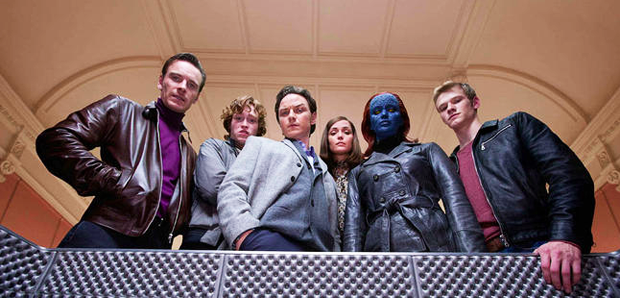How do you reboot the concept of a reboot? With a director who values originality, leadership, a strong team, and the power of rabid fans to say whatever the hell they want (as long as they're saying something). Sound like any successful entrepreneurs you know?

By the time a film series gets to its fifth installment, the last throes of a franchise usually fall somewhere in between disappointment (Star Wars Episode II: Attack of the Clones), or blatantly shameful money grabs (National Lampoon’s Christmas Vacation 2: Cousin Eddie’s Island Adventure). But now there’s the curious case of X-Men: First Class.
The X-Men franchise, though still profitable, hasn’t creatively evolved since the second film,X2, which was released almost a decade ago. Critics have largely panned subsequent strains of the mutant flicks, including Brett Ratner’s X-Men: The Last Stand (2006) and X-Men Origins: Wolverine (2009). First Class is a film whose title sounds like it's sponsored by American Airlines. Instead, it may just be the best installment to date. Only the filmmakers and Fox can say for sure how this happened, but we’d argue the flick’s early buzz and optimistic box office estimates come from treating First Class less like a rusty franchise in need of a reboot and more like a startup that generated a new set of rules for sequel-loving Tinseltown. Here’s five of them we spotted.
1. Welcome New Leadership
No, Charles Xavier and Erik Lensherr (aka Magneto) are very much still in charge during the course of the film. It’s director Matthew Vaughn who was the relative unknown that was tapped to get behind the camera. The X-Men films are a character driven study--the struggle for outcasts to be accepted within society. Bryan Singer, who directed the first two films, used his experiences as an openly gay man to form the basis for the mutant point of view--it gave the first two films gravitas. After Singer left, directors Brett Ratner and Gavin Hood traded gravitas for non-stop action. What Vaughn brings to the proceedings is a sense of intrigue and danger. Vaughn, known for his cult hits Layer Cake and Kick-Ass, treats this new X-Men film as a '60s spy thriller in the vein of Bond classics like Dr. No. In other words, Vaughn traded all out action for intrigue.
2.) Reinvent Instead of Reboot
Star Trek played this nifty trick back in 2009; going back to the origins of the Starship Enterprise and in the process, creating a whole new timeline. Now, First Class, technically, is still part of the same story as the original films. Thematically, it’s not a true reboot. Financially and creatively, it’s a reboot. Setting the film in 1962 allowed Vaughn to not only take a fresh look at a group of characters that had become stale, but it also allowed him to up the ante, so to speak, by inserting the X-Men into a historically significant event--namely the Cuban Missile Crises. Basically by going back in time, Vaughn avoids the cluttered mess that Ratner left him in the present--the result is clean and fresh.
3. ) Pare Down Over Amp Up
There are one million different mutants depicted on-screen in X-Men: The Last Stand andX-Men Origins: Wolverine. OK, that’s an exaggeration, but there were over 30 in The Last Stand, alone. Which meant that there was really no time to dawdle on the relationship between Charles and Erik that made the first two films so good because, hey, we must be introduced to a guy who can gain weight on command (apparently that’s a real power). First Class is Charles and Erik’s story. Sure, other characters surround them--but only five other mutant X-Men. Put it this way: Last Stand ended with an all out battle with so much action on screen that it caused sensory overload. First Class’ signature scene is an important lesson for everyone that "less is more."
4. ) Hire a Team, Not a Marquee
You know what also happens when you marginalize (or kill off) the best two characters from the first two movies? You also marginalize the two best actors in the original X-Menseries: Ian McKellen and Patrick Stewart. Obviously, since First Class is a prequel, McKellen and Stewart aren’t going to be able to reprise their roles. Vaughn was wise to seek out Michael Fassbender and James McAvoy to play the roles of Erik and Charles--two actors who have so much charisma on screen that a lot of the supporting characters become an afterthought … and well they should be. Again, this is the story of Erik and Charles. Fassbender and McAvoy are so good together that it (almost) makes you forget how good McKellen and Stewart were together.
5. ) Trust Word of Mouth
Obviously a lot of the topics already hit on are a good way to produce word of mouth box office--i.e. being a good movie. And it does: As of this writing, First Class checks in at 87% Fresh on Rotten Tomatoes–-so it has the critical word of mouth. Thankfully, because certainly the initial ad campaign from Fox for First Class didn’t help. Even Vaughn has been critical of some of the initial images released, going as far to tell/Film at one point, "When I found out, I said, what the fuck is this shit, and Fox is running around trying to figure out what happened as well. I agree. It’s like a bad Photoshop…" So, yeah, this is a movie that better have good word of mouth. Though, thankfully, Fox finally stopped releasing Photoshop-esque images and, instead, just started writing big fancy "X"s in the sky--which has paid off with a viral marketing campaign that no floating head of January Jones would ever produce.
http://www.fastcompany.com/1757346/5-ways-x-men-first-class-is-like-a-startup-business
No comments:
Post a Comment